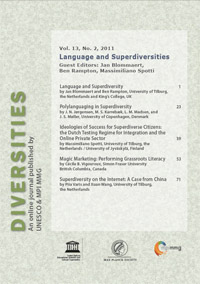Ideologies of Success for Superdiverse Citizens: the Dutch Testing Regime for Integration and the Online Private Sector
by Massimiliano Spotti (University of Tilburg / University of Jyväskylä)
This article deals with the testing regime of integration in the Netherlands. More specifically, it shows how a monoglottal and monocultural ideology inhabits the political discourses issued and authored by agencies within the Dutch government when dealing with testing for both admission (toelating) and civic integration (inburgering) of (newly arrived) migrants. Further, it shows how a vigorous private online sector in Dutch language courses has grown up, and has utilized semiotic resources that present Dutch language as the vehicle through which migrants can deliver a positive contribution to social cohesion in mainstream society. The article concludes by advancing some reflections on two issues. First, on what it means to know a language. Second, on the construction of the migrant as an economic actor whose chances for social upscaling are based on the amount and level of certifications one can afford to purchase.
Suggested bibliographic reference for this article:
Spotti, M. (2011). Ideologies of Success for Superdiverse Citizens: the Dutch Testing Regime for Integration and the Online Private Sector. Diversities, 13(2), 39-52. Retrieved [todaysdate] from https://newdiversities.mmg.mpg.de/?page_id=2064
|
